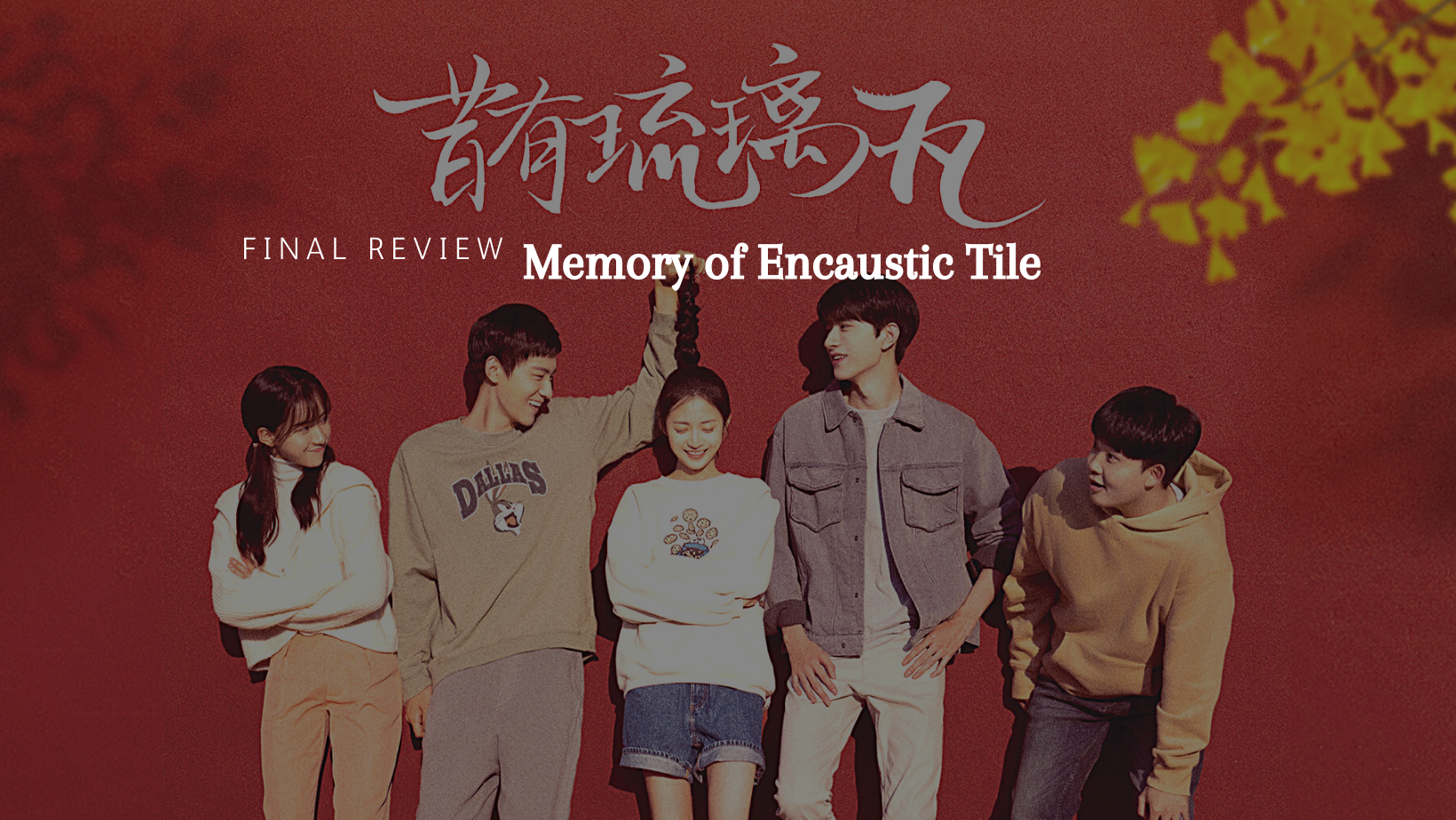Memory of Encaustic Tile (昔有琉璃瓦)
Synopsis
Based on the original novel of the same name, the play tells a love story between a wandering translator. Shao Xue, and a conservator, Sunian, against the backdrop of the alleys inhabited by conservators. (Source: IMBd)
Adapted from the novel “Glazed Tiles of the Past” (昔有琉璃瓦) by Bei Feng San Bai Li (北風三百里).
Starring
- Chen Yu Qi (陈钰琪) as Shao Xue
- Lin Yi (林一) as Zheng Su Nian
- Yan Zi Dong (晏紫东) as Zhang Qi
- Tian Ai (天爱) as Lin Shi Yin
- Sun Kai (孙凯) as Wu Huan
Watch Memory of Encaustic Tile (昔有琉璃瓦) if you like:
- Family drama as the show focuses on heartwarming family relationships
- Nostalgia was well portrayed and felt from old technology to passing of youth
- Melodrama
Avoid Memory of Encaustic Tile (昔有琉璃瓦) if you dislike:
- Slow burn romance as romance doesn’t develop until the last third of the drama
- Focus on many side characters and their stories that doesn’t relate to main protagonists
- Second lead who doesn’t get treated right in the show (may be a personal opinion)
Final Review: Memory of Encaustic Tile (昔有琉璃瓦)
Leaving a Legacy With You
Rating: ★★☆☆☆ 2/5
Memories of Encaustic Tile follows five youths and their families in the early 2000s. As I mentioned in my first impressions and reaction commentary, I enjoyed seeing time moved through real-life events, which created a lot of nostalgia. They go through the SARS epidemic, the announcement of the Beijing Olympics, the introduction of the technology in the 2000s, eventually online shopping, and looping it all back to the Beijing Olympics ceremony. We get a sense of how much time passes through events like these, which contrasts with the show’s highlighted job, being a conservator. While I have seen none of the following, Memories of Encaustic Tile has been compared to shows like Go Ahead (2020) and the popular South Korean Reply series.
Memories of Encaustic Tile started out interesting, focusing on family relationships and the friendship between the five children before it slowly became more youth and romance-focused. I didn’t quite find a good balance with the romance. It was more of a slow burn for two-thirds of it and then rushed in the last third. It could’ve been a great family drama that didn’t turn out to be. I felt like there was a bit of try-hard going on with the heartwarming and feel-good type of scenes, even though they were cute to watch. I don’t think this one did it quite for me, but I’d say it was a decent watch.
Themes
Follow your dreams
Like many youth dramas, Memories of Encaustic Tile has the theme of youths following their dreams. What was interesting about these dreams or goals of each youth was that many of them weren’t profound. Shao Xue has always known that she wanted to travel the world, and though her journey was delayed, she sought it to happen. Did she know how she wanted to travel or the best way to do so? Certainly not, but every opportunity that Shao Xue saw that could help her get a stepping stone to a foreign land, she took it. Was there a special reason for Shao Xue to want to travel? Not really, except for the fact that it sounded magical. Sunian realized his dreams late (leaving something behind for the world) and was probably behind many of his peers, but he worked hard for it. Shi Yin pursued what she liked (anchor) even though her parents disagreed. Zhang Yi never cared for anything except for gaming and only chose his path (mathematics) because it was what he was good at. Wu Huan knew that he wouldn’t do well in school and decided to start his career early in something he already had experience in. As you can see, these dreams and goals weren’t profound, and many of these characters went with the flow of their life and what made sense to them. Though they were setbacks to their dreams or career, each character learned to not lose themselves in their fight to continue their journey.
Family
Family was an important theme in the show. It showed that though these people were just friends, neighbors, or coworkers, they saw each other as family. When it came down to helping each other out, they were always ready to be there for one another. Each character that comes and goes in the alleyway means something more than just a shopkeeper or a street food vendor. And without one individual, there will be an empty hole left unfilled. For example, though Shao Xue wanted to study abroad and adamantly fought for it, she was reluctant because she worried about her parent’s well-being. However, our greatest example was the loss of Ji Ning in the neighborhood. How everyone came together to help the Zheng family and grieve with them.
Letting Go
There were a lot of moments in this show when these characters had to learn to let go when the time came. Many characters went through their own personal trial of love and loss. Only when they decided to let go did they find that everything would be okay and that many good things were still waiting for them on the other side.
Conclusion
This drama started out well but eventually felt quite dragged out. There were many highs and lows in the drama due to its disjointed focus. At times, there was a heavy emphasis on the families, supporting characters, or coworkers’ stories. Then it would circle back to the youths, but ultimately, what mattered most was Shao Xue and Sunian’s story. It was difficult to connect with Qiao Mu and Si Yuan’s love story as we only got glimpses of it, and eventually, they were written off. Yun Sheng and Ms. Kang’s connection didn’t contribute much to the plot either. I didn’t find the additional stories of the side characters to add much depth to the overall drama. Due to the abundance of extra content, Shao Xue and Sunian’s romance only begins in the last third of the drama and feels rushed. I enjoy a good family and melodrama, but not when they aren’t thoroughly blended to my liking. I felt that other compelling characters, such as Zhang Qi or Wu Huan, were overshadowed by others. This was disappointing because I preferred their personal stories and personality traits. For example, Pei Shu pales in comparison to Zhang Qi as the funny friend character. However, these are just my opinions. It’s possible that these issues stem from adhering to the book, where the absence of Zhang Qi (studying abroad) would logically make more sense. Nevertheless, I felt a pang of disappointment each time he was neglected. With that being said, this is my belated review of Memory of Encaustic Tile. If you have watched Memories of Encaustic Tile and wouldn’t mind sharing your opinions, I’d love to read them!



